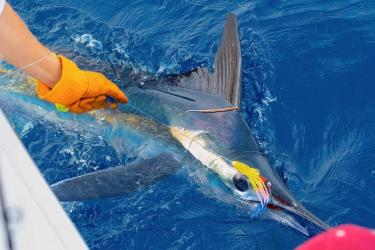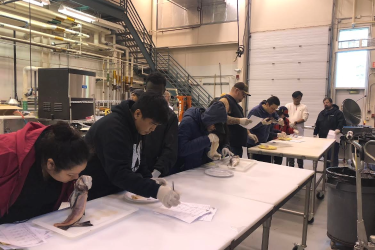Where did you grow up?
I grew up just south of Detroit, in Woodhaven, Michigan—one of the communities that make up “Downriver”.
Where did you go to school and in what subject did you get your degree(s)?
I have a Bachelor’s of Science in Anthropology-Zoology from the University of Michigan (Go Blue!). I received a Master’s of Science in Marine Biology from the University of North Carolina Wilmington, and my Doctorate in Anthropology from the University of Maryland.
How did you come to work at the Southeast Fisheries Science Center?
I was a post-doc at the Auburn University Shellfish Laboratory, located on Dauphin Island, Alabama. While keeping my eye out for opportunities and looking ahead to the next step, someone (well, multiple someones) shared a job posting for an aquaculture social scientist contractor position at the science center.
Previously, I had done research working with shellfish growers and commercial fishermen and fisherwomen along the Atlantic and Gulf coasts. We identified the benefits they received through their work, as well as interest from and access for commercial fishermen thinking about aquaculture. Ultimately, I sought to understand whether shellfish aquaculture could fill a sociocultural role similar to a wild fishery at the individual and community level. As a post-doc, my research focused on the seafood service sector through a project with Bill Walton (now at Virginia Institute of Marine Science). We wanted to identify factors that influence seafood purchasing among chefs and wholesalers and how that affects markets for aquacultured products.
The position with the science center was a good fit given my background. It also provided the opportunity to conduct aquaculture policy-relevant research in a new setting. Not only do I get a new perspective from within NOAA Fisheries and the science center, but I get the chance to think about the expansion of aquaculture with different species across the country.
What do you do at the science center?
My broad role is to conduct research and provide expertise related to the social dimensions of aquaculture, such as who benefits from aquaculture expansion and how. Specifically, my position focuses on supporting the development of Aquaculture Opportunity Areas and assisting regional teams when considering the potential social impacts of aquaculture siting. I also provide input and social science expertise related to aquaculture projects and permitting in the Southeast region.
What do you like most about your position?
I’m still relatively new to the role starting in March, but I appreciate the potential to enhance local community representation and perspectives in aquaculture planning and development. In addition, as the U.S. aquaculture industry grows, socially relevant research questions abound. I look forward to the chance to answer some of these questions critical to sustainable and community-responsive aquaculture development.
What do you like to do outside of work?
I try to do anything I can to be outside. Fortunately, Miami offers plenty of opportunities for that. I can most often be found taking (very) leisurely strolls with my senior pup and later trying to make up for that pace by running. I’m currently training for the Miami half-marathon in February and really appreciating Miami’s winter running weather. I also like to explore the local waters as much as I can, by board, boat, or fins.





